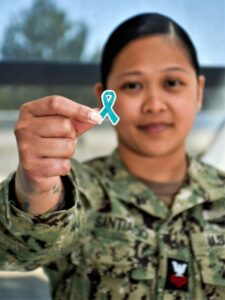
Story by Douglas Stutz
Naval Hospital Bremerton/Navy Medicine Readiness and Training Command Bremerton
For Hospital Corpsman 1st Class Robediane G. Santiago, becoming a victim advocate was more than just a natural extension of her Navy career.
The choice was emblematic of everything she holds dear as an empathetic person and trained hospital corpsman pledged to serve and protect her fellow warriors at all times.
“As a hospital corpsman, taking on the role of a victim advocate can provide additional skills and perspectives that can enhance your ability to provide care and support to patients. It can help you develop empathy, communication skills, and an understanding of trauma,” said Santiago, currently assigned to Navy Medicine Readiness and Training Command Bremerton.
With April designated by the Department of Defense as Sexual Assault Awareness and Prevention Month, victim advocates such as Santiago take on an active role as part of the command’s Sexual Assault Prevention and Response team in the Navy’s third largest fleet concentration.
Santiago, of Carson, California, has received special training to become a Navy victim advocate. She is qualified in assisting a sexual assault victim in attaining their personal route to recovery by advising them on such procedures as reporting options and various resources. Part of her duties also include explaining how the Navy restricted and unrestricted reporting policy encourages victims to seek medical treatment that is available to them without fear of reprisal or stigma.
She is also there to provide a non-judgmental shoulder to lean on.
“I chose to become a victim advocate to support and empower. Advocates play a crucial role in providing emotional support, information, and resources to victims during a difficult time,” explained Santiago. “A victim advocate is someone who provides support and assistance. They may accompany survivors to medical appointments and court proceedings and provide resources for counseling and other forms of support. Essentially, they are there to help them navigate the aftermath of a traumatic experience and ensure they have access to the help they need.”
Compiled data by the DoD shows there were 2,052 Navy sexual assaults reports by victim for fiscal year 2022, with the majority – 1,962 – of reports made by service members. That’s approximately two thousand incidents a victim advocate like Santiago received an emergency call to support someone in need.
The crucial obligation of providing timely care is fully understood by Santiago.
“The most important responsibility of a victim advocate is to ensure the well-being and empowerment of sexual assault victims to make sure they don’t feel alone. This includes providing emotional support, helping them understand their rights, and connecting them with resources such as counseling services or legal assistance,” Santiago stated.
Her background as a hospital corpsman allows Santiago to use her experience in patient care to also help with the vital collateral duty of being a victim advocate.
“As a hospital corpsman, taking on the role of a victim advocate can provide you with additional skills and perspectives that can enhance your ability to provide care and support to patients,” Santiago remarked. “It can help you develop empathy, communication skills, and an understanding of trauma.”
Naval Hospital/NMRTC Bremerton had held a host of events for staff, patients and visitors, all specifically designed to increase awareness on sexual assault. There’s been a ‘Chalk the Walk’ interactive display, Teal Ribbon group photo shoot, [wear] Teal Tuesday and more. Santiago and other victim advocates are actively involved.
“I am leading the SAAPM 5K [3.1 mile] run and participating in all the events Sexual Assault Prevention Response uniformed victim advocates are hosting,” said Santiago, who attended Don Antonio Bongolan Memorial High School, Philippines and graduated in 2012.
Her Navy Medicine career started after word got out she was strongly considering going back to the South Pacific to continue her education.
“A family friend found out that I was going back to the Philippines to finish college and insisted that I at least talk to a recruiter at the Navy Recruiting Office after telling me some of the benefits in joining the Navy. The benefits offered by the Navy were very intriguing and made me interested. It was a choice between logistics or the medical field, but deep down, I knew that I was more passionate about helping other people. Navy Medicine has a plethora of worlds, and I’m glad I made this decision,” related Santiago, born in the Philippines and lived there until her junior year of college.
After her family moved to the U.S., she enlisted in the Navy.
“Taking care of patients has proven becoming a hospital corpsman was the best choice that I could’ve made. Throughout my naval career, I’ve been blessed with outstanding mentors who upheld not just the core values of the Navy, but also their personal values highlighting respect. Now, I’m focused on paying it all forward by reciprocating those values to the Sailors I work with,” stated Santiago, who has been stationed at Annapolis, Maryland, Kings Bay, Georgia and Camp Lejeune, North Carolina before her current location.
When asked to sum up her experience with Navy Medicine in one sentence, Santiago replied, “My experience with Navy Medicine has been rewarding and impactful, allowing me to contribute to the health and well-being of our service members and their families.”
The Navy Sexual Assault Prevention and Response program mission is to prevent and respond to sexual assault with concise education, comprehensive response, compassionate advocacy, and just adjudication to promote professionalism, respect, and trust, while preserving Navy mission readiness.